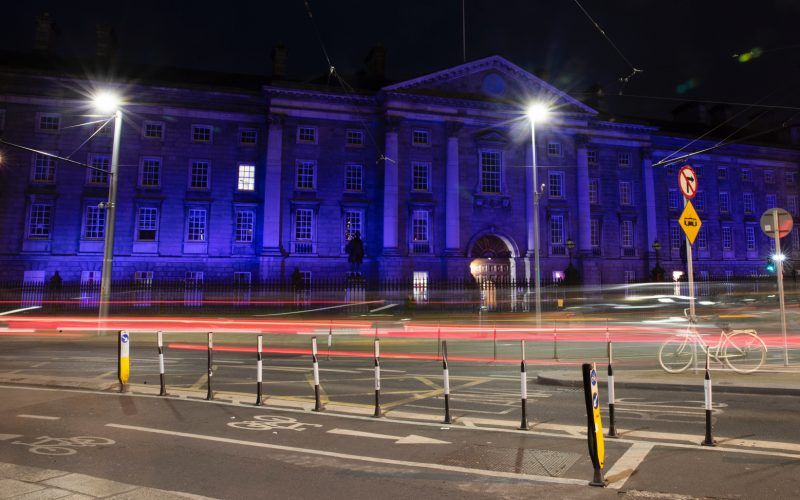Trinity to ‘Go Atlantic Blue’ for World Oceans Day
Posted on: 07 June 2019
Trinity will join a host of other famous buildings and landmarks across Ireland and ‘Go Atlantic Blue’ over the coming weekend to celebrate our connection to the Atlantic Ocean, as part of World Oceans Day.
The global day (Saturday 8 June) connects people worldwide in celebrating the ocean, its importance in our lives and how each of us can protect it, no matter where we live.

Trinity will join the likes of Dublin Airport, King John’s Castle in Limerick and Baily Lighthouse in lighting its buildings blue. Additionally, a suite of businesses, shops, schools and homes across the country will also ‘Go Atlantic Blue’ on the day.
Everyone’s participation will highlight the strong connection that people in Ireland have with the Atlantic Ocean and the multiple ways that it affects and enriches our daily lives.
‘Go Atlantic Blue’ is being spearheaded in Ireland by the Marine Institute-led AORA-CSA (Atlantic Ocean Research Alliance Co-ordination & Support Action) against the backdrop of SeaFest 2019 (7-9 June) and Our Ocean Wealth Summit (9-10 June). SeaFest is Ireland’s national maritime festival and Our Ocean Wealth Summit is Ireland’s flagship event for the marine sector.
It’s the first year to ‘Go Atlantic Blue’ with the aim of raising awareness of the vital role that the Atlantic Ocean plays in the lives of Irish people, no matter how near or far they live from the Atlantic coastline.
Among the activities that AORA promotes are the development of an ‘Atlantic community’, made up of citizens of countries that neighbour the Atlantic Ocean, and also exploring, observing and mapping the remainder of the Atlantic Ocean floor (which AORA calls “the Last Great Exploration Campaign on Earth”).
Director of Atlantic Ocean Research Alliance Co-ordination & Support Action, Dr Margaret Rae, said: “In Ireland, the Atlantic Ocean means so much to us. It’s our largest natural resource and we draw so much from it – our livelihoods, food, bounty, beauty, imagination, inspiration, song, poetry, health and wellbeing and much, much more. Going Atlantic Blue is a way to draw attention to how each and every one of us experiences the Atlantic, what we love about our Ocean and how we can be that generation that makes a difference.”
Marine research in Trinity

Dr Nessa O’Connor’s team study the impacts of climate change (ocean warming and acidification) and other human activities on the health of our marine ecosystems.
For example, in a project funded by the Marine Institute, Dr O’Connor’s team are testing how changing ocean chemistry is affecting the Irish shellfish industry. As a coastal city Dubliners are inextricably linked to the ocean.
In another new project, funded by the Irish Research Council, Dr O’Connor and Professor Poul Holm are working with local chefs to reinvigorate the tradition of eating seafood from sustainable sources including shellfish and seaweed.
Dr O’Connor said:
We are only starting to unlock the potential of our ocean wealth to tackle global challenges including clean energy, food production and human diseases. Yet many human activities are damaging our oceans. It is vital that we understand the impacts of all our activities while also developing sustainable solutions that expand our marine economy.
One such potential expansion involves harvesting large algal species from the sea for high-value biotechnological applications. You can read a recently published paper of Dr O’Connor’s on this topic here.
Dr Nicholas Payne is another of Trinity’s scientists working in marine biology. His group explores how environmental variation regulates the distribution and behaviour of aquatic animals.
Dr Payne has studied a broad range of species – from sharks to cuttlefish – with research objectives spanning biogeography to biomechanics. His team often uses novel technologies to record the movements and behaviour of wild animals, and is increasingly interested in how such approaches can be informative for understanding species distributions, and thus for managing and conserving our fisheries resources.
His team has just returned from a trip to the Bahamas where they learned all about the secret lives of the region’s tiger sharks. You can read all about this incredible research here.
